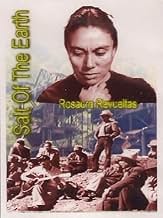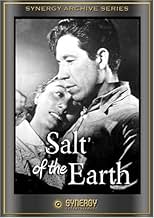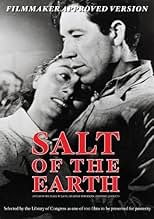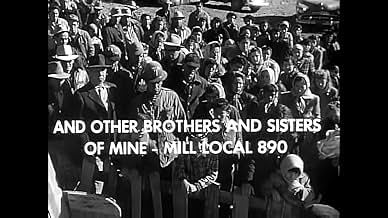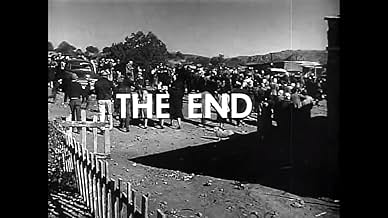Cuando unos trabajadores mexicanos en una mina de zinc convocan una huelga general, es solo a través de la solidaridad entre los trabajadores y la determinación indomable de sus esposas, mad... Leer todoCuando unos trabajadores mexicanos en una mina de zinc convocan una huelga general, es solo a través de la solidaridad entre los trabajadores y la determinación indomable de sus esposas, madres e hijas que triunfan.Cuando unos trabajadores mexicanos en una mina de zinc convocan una huelga general, es solo a través de la solidaridad entre los trabajadores y la determinación indomable de sus esposas, madres e hijas que triunfan.
- Dirección
- Guión
- Reparto principal
- Premios
- 4 premios en total
- Ramon Quintero
- (as Juan Chacon)
- Barton
- (as David Wolfe)
- Consuelo Ruiz
- (as Angela Sanchez)
- Charley Vidal
- (as Ernest Velasquez)
Reseñas destacadas
Third, the themes remain quite relevant. When we see footage of, say Bolivian coca growers taking to the streets to overthrow their country's US-sponsored tycoon president, what's so surprising about a community of Mexican American workers standing in solidarity against an exploitative mining company? When we see Justice for Janitors bringing the owners of LA's office towers to the table (at least), what's so far-fetched about workers in Salt of the Earth grabbing a bit of justice for themselves? I could go on.
From the vantage point of 2003, Salt of the Earth looks like a refreshing change. Agitprop is news to a lot of people today - it can be powerful if done well, yet we're now all conditioned to think that any form of dramatic art that doesn't center obsessively on the isolated individual is false and/or sentimental. Is Salt of the Earth really more sentimental than On the Waterfront (made about the same time), in which a corruption struggle on the New Jersey docks serves merely as the scenery for Marlon Brando's emoting about his boxing career?? Come on!!
People who stand in solidarity really are powerful. Americans are taught not to think so, but it's when they stand up together, not separately, that they win the biggest victories (and I don't mean in uniform, either).
Most filmmakers went along with this state of affairs, some prosecuting, others dobbing in their former friends and colleagues. Any director wanting to be critical - eg Sirk, Ray - had to do so covertly, sublimating their protest through genre, form or allegory. What is so heartening and jolting about this film is that it dares to say out loud what it means. This is not surprising, as all the key crew members had been blacklisted and director Biberman had served six months for not cooperating with the HUAC. It is not negative, but celebratory. It is, as the dedication implies, a most American film, a light of liberty in a very unAmerican darkness. Of course it was banned, the production undermined by the government, the FBI and local vigilantes, while Rosaura Revueltas, the Mexican actress in the lead, was repatriated, never to work again.
SALT OF THE EARTH tells the story of Esperanza (hope), a poor New-Mexican housewife living in impoverished, insanitary conditons, whose husband Ramon works in salt mines once owned by her grandfather, now exploited by vicious American capitalists. Conditions in the mines are appalling, and after a fatality due to deliberately lousy safety measures, the men go on a strike which stretches out for months, intimidating incoming scabs. When the corrupt sheriff slaps a court order on them, their wives take up striking duty.
Of course, the film is a riposte not only to latterday 'America' but also the Hollywood that served it. Demonised as red propaganda, it is anything but - propaganda is an attempt by the ruling class to brainwash its subjects through lies and false promises; this beautiful film is a statement from an embattled peoples with no voice in the mainstream media. This film breaks all the rules (for once one can say this and actually believe it!). Its subject matter is work, the working classes, the right to work. It features no Hollywood stars (indeed, many of the actors, as in an Italian neo-realism film, are locals), no racist melting pot aspirations, but genuine ethnic people with their own culture and customs. In a reversal of current Hollywood practice, it is the white man who is marginalised and demonised.
What is remarkable about the film, which is essentially a plea for help, is how politically sophisticated it is. It would have been perfectly understandable for the filmmakers to simplify their message in the current political climate, but they hearteningly refuse to do so. Although the fascist mine-owners and lawmen are clearly villains, the film explores the tensions within the very patriarchal New-Mexican community itself. The union links workers' rights with racial equality, but the men do not extend this to women. But this is the story of a woman, a meek housewife who is transformed into an active worker, a full woman, someone with a voice and a very powerful role in society. Like a Hollywood film, SALT does dramatise its social subject matter around one main couple, but this crystallises, rather than dilutes, the issues. The men see the increasing power of the women as further humiliation of their power, but divided by gender the New-Mexicans have no power, they are despondent, starving, at the mercy of sadistic capitalists. Together they have extraordinary power, culminating in the remarkable evicition scene, a rare celebration of group power in the American cinema - one of that cinema's most powerful scenes.
Esperanza moves from a position of having no voice in society, no public arena like the men in which to speak, indeed barely a space in her own home, where her dreams and desires are transferred to a radio playing other people's songs; to a political activist, someone who does not limit her life to housework and children, indeed demands her husband does his share, and this is represented by her narration, her power to tell and control a story, to speak authoratively for a people, to translate for us their language.
The 'emasculation' of the men provides the film with some of its funniest scenes, but there is a darker side to New-Mexican masculinity - the implied wife-beating, for example. In one of the most heartbreaking sequences, despondantly humiliated, they see a magazine picture of their enemy about to go out hunting, 'a man of distinction', and they decide to imitate him, erasing themselves, their pride and responsibilities. It is their lowest ebb.
Like I say, the film has its flaws. There is a naivete to the neo-realist model that allows for a proto-hippy idealism that is not always convincing. The strongly political form of the film sometimes slips into the drama, making certain scenes seem didactic and unreal. Sometimes you wonder what a Bunuel might have done with the material. But this is an honorable treasure in the American cinema, which should always be shown to remind us that we do not always have to cow to tyranny.
¿Sabías que...?
- CuriosidadesBecause the producers feared both sabotage and destruction of the film, the exposed footage had to be developed in secret, at night, by a sympathetic lab technician, with the film delivered in unmarked canisters.
- PifiasWhen Ramon is in the bar, his hands change position several times between shots.
- Citas
Esperanza Quintero: Whose neck shall I stand on to make me feel superior, and what will I have out of it? I don't want anything lower than I am. I am low enough already. I want to rise and to push everything up with me as I go.
- Créditos adicionalesOpening credits prologue: our scene is NEW MEXICO LAND OF THE FREE AMERICANS WHO INSPIRED THIS FILM
HOME OF THE BRAVE AMERICANS WHO PLAYED MOST OF ITS ROLES.
- ConexionesFeatured in Precious Images (1986)
- Banda sonoraWe Shall Not Be Moved
(uncredited)
Traditional
Sung by the women on the picket line
Selecciones populares
- How long is Salt of the Earth?Con tecnología de Alexa
Detalles
- Fecha de lanzamiento
- País de origen
- Idiomas
- Títulos en diferentes países
- Salt of the Earth
- Localizaciones del rodaje
- Empresas productoras
- Ver más compañías en los créditos en IMDbPro
Taquilla
- Presupuesto
- 250.000 US$ (estimación)
- Duración
- 1h 34min(94 min)
- Color
- Mezcla de sonido
- Relación de aspecto
- 1.33 : 1


